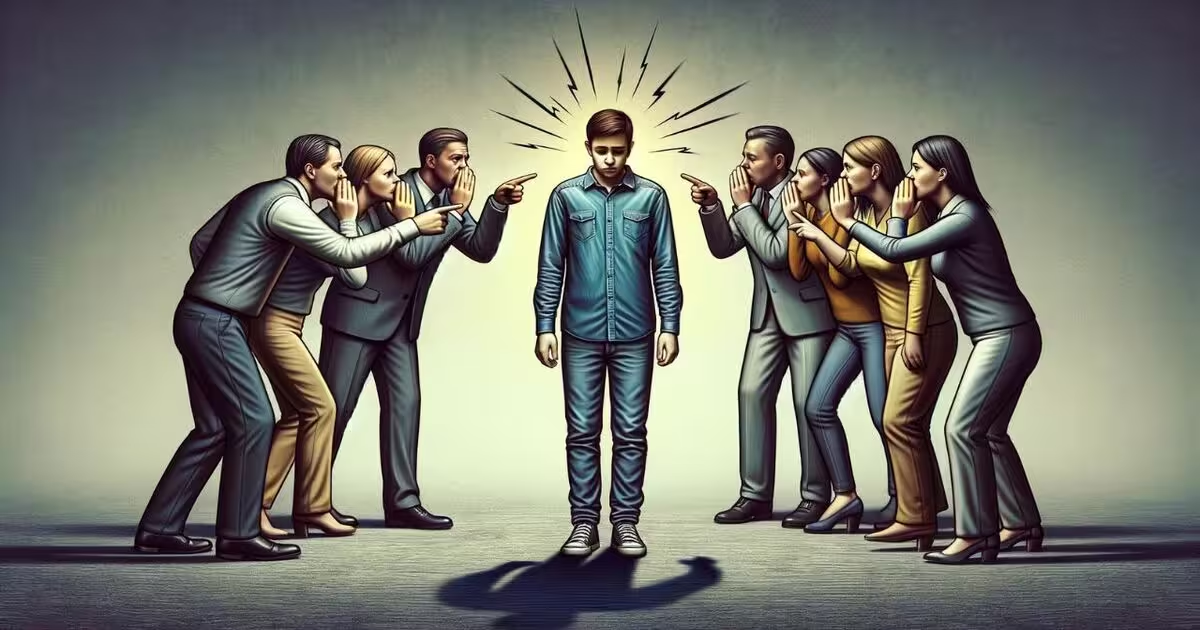What is Gaslighting? And How to Respond to It More Effectively!

Have you ever felt like someone was playing tricks on your mind? Maybe someone close to you kept telling you that you’re remembering things wrong, or that what you saw or heard didn’t happen.
That’s gaslighting, and it’s a lot more common than you might think. It’s not just in movies or dramas; it happens in real life, in relationships, families, and even at work.
Gaslighting is like someone moving the furniture in your house and then denying it ever happened, leaving you to question your memory.
The person doing this – the gaslighter – is trying to control or have power over you, making you doubt yourself. It’s a sneaky way of messing with someone’s mind, and it can make you feel really small and confused.
But it’s not just about playing mind games. Gaslighting can seriously mess with your head and heart. It can make you feel anxious and sad and can knock down your confidence.
It’s like someone taking an eraser to your feelings and memories, rewriting them in a way that makes you feel lost.
In this article, we’re going to break down what gaslighting is. We’ll show you how to spot it, understand why some people do this to others, and most importantly, we’ll talk about ways to deal with it.
It’s like learning how to spot a magician’s tricks – once you know what to look for, they can’t fool you as easily anymore. So, let’s get started and learn how to keep your sense of reality strong and clear.
Subscribe to Create Higher Vibrations!
Get Inspiration and Practical advice straight to your inbox.
What is Gaslighting in Relationships
Imagine someone telling you the sky is green when you know it’s blue. That’s a bit of what gaslighting feels like in relationships.
It happens when someone close to you – like a partner, a family member, or even a friend – keeps telling you that your feelings or memories are wrong. It’s like they’re trying to repaint your reality, making you doubt what you know is true.
In romantic relationships, gaslighting can be especially tricky. It might start small, like your partner saying you’re too sensitive when you’re upset about something they said. Over time, it gets bigger.
They might deny saying things that hurt you or act like important conversations never happened. It’s like they’re erasing parts of your story and writing them over.
But it’s not just in love where gaslighting shows up. In families, it can be a parent or a sibling who always questions your version of events, making you feel like you can’t trust your mind.
At work, a boss or colleague might deny conversations or agreements, leaving you confused and unsure. This kind of manipulation, where someone messes with your head to gain power or control, isn’t just mean – it’s a form of emotional abuse.

Recognizing the Gaslighters’ Playbook
Now, let’s talk about the people who do this – the gaslighters. These are the folks who want to have the upper hand by making you question yourself. They’re not always easy to spot because they can be charming and convincing. But there are signs you can look out for.
First, there’s lying. Gaslighters are pros at it. They can lie so smoothly that you start doubting your memory. Then, there’s denying. You might be sure they said something hurtful, but they’ll swear up and down it never happened. It’s like they’re trying to rewrite history.
Another trick in their book is spreading rumors or telling lies about you to others. This is a sneaky way to undermine your reputation and make you feel isolated. They might also shift the blame onto you, making you apologize for things that aren’t your fault.
In the workplace, this can look like someone taking credit for your ideas, or a boss who denies ever giving you instructions, making you look bad. It’s a toxic environment where you’re left second-guessing your every move.
Remember, the goal of the gaslighter is to throw you off balance. They want power and control. They do this by distorting your reality, making you feel less confident and more dependent on them. It’s a game of mind control that can leave you feeling lost and alone.
8 Signs of Gaslighting Behaviors
1.) They Lie To You
Habitual and pathological lying is a common tactic in gaslighting. The gaslighter sticks to their false narrative, refusing to change their story even when confronted with proof.
They often use phrases like “You’re making things up” or “That never happened,” leading you to question your memory and the validity of your experiences.
2.) They Devalue You
To devalue you, gaslighters spread false information about you to others. They may pretend to be concerned about your well-being while subtly suggesting that you’re unstable.
By convincing you that others have negative opinions about you, they isolate you and increase your dependency on them.
3.) They Use Distractions
Gaslighters adeptly avoid direct answers by changing the topic, a method to evade accountability. This tactic makes you question the need to pursue your concerns, steering conversations away from their actions and making you doubt the importance of your worries or suspicions.
4.) Your Thoughts and Feelings are Irrelevant
Trivializing your emotions is a common gaslighting behavior. By undermining your confidence in your feelings, they create a power imbalance in the relationship. The gaslighter’s dismissal of your thoughts and emotions leads you to question your self-worth and judgment.
5.) Blame-shifting
Blame shifting is a technique where the gaslighter deflects responsibility onto you. They often accuse you of overreacting or being the problem, thereby evading their accountability. This behavior leaves you feeling confused, unsure, and often guilty for the supposed issues in the relationship.
6.) They Deny, Deny, Deny
A classic sign of gaslighting is persistent denial. Gaslighters refuse to admit fault, especially in abusive situations, compelling victims to doubt their own experiences and perceptions. This steadfast denial is a cornerstone of their manipulation, making it challenging for victims to trust their reality.
7.) They Use Kindness as a Weapon Through Words
Gaslighters often use kindness as a weapon, phrasing words in a way that makes you question yourself. Underneath seemingly kind and caring words often lie their true intentions to manipulate and control, which can be particularly disorienting as it cloaks their abusive behavior in a veil of false concern.
8.) They Rewrite The Past
Gaslighters commonly retell events in ways that are favorable to themselves, altering the narrative to suit their agenda. This causes you to question your memory and perception of reality, often leading to confusion and a sense of disconnection from your own experiences.

The Psychological Impact of Gaslighting
When someone keeps messing with your reality, it’s like a small drop of water on a stone – over time, it leaves a mark. That’s what gaslighting does to your mental health. It’s not just a few lies or denials; it’s a constant drip of doubt that can wear down your sense of self.
One of the biggest hits you take from gaslighting is your self-esteem. You start to feel unsure about your decisions, memories, and even your feelings. It’s like walking through a fog, not knowing which way is up or down. You start to lose who you are.
This self-doubt can lead to isolation. You might pull away from friends and family because the gaslighter has you thinking they won’t understand or believe you. It’s a lonely place to be.
Then there’s the emotional toll. Gaslighting can leave you feeling anxious or depressed. You’re always on edge, trying to piece together your reality, which is exhausting.
It’s like carrying a heavy backpack that just gets heavier every day. Some people even start to show symptoms of PTSD because the psychological impact is so intense.
In relationships, especially abusive ones, this mental and emotional turmoil is amplified. The gaslighter might use your emotions against you, saying things like, “See, you’re too emotional,” or “You’re not thinking clearly.” It’s a vicious cycle that can make you feel trapped.
Gaslighting as a Form of Emotional Abuse
Gaslighting isn’t just a bad habit; it’s a form of abuse. It’s a way to control and hurt someone emotionally and mentally. The scary part is that it can happen to anyone. It doesn’t matter if you’re strong, smart, or independent. Gaslighting sneaks up on you, and before you know it, you’re caught in its web.
In romantic relationships, gaslighting can turn toxic very quickly. One partner might use manipulation to gain power over the other. They might play mind games, like saying they’ll change and then going back on their word. It creates an imbalance in the relationship, where one person has all the power and the other feels powerless.
The same can happen in families or between friends. A family member might deny past abuse or a friend might manipulate you into doubting your own experiences. It’s a way to keep you under their thumb, questioning your mind and reality.
Gaslighting can also show up in stereotypes and social dynamics. It can be used to exploit vulnerabilities, like someone using societal stereotypes to undermine a person’s credibility. For instance, saying a woman is just being “hormonal” or “overreacting” is a way to dismiss her feelings and experiences.
Remember, gaslighting is not just a series of lies or denials; it’s a deliberate tactic to abuse and control. Recognizing it for what it is – abuse – is the first step in taking back your power and beginning the journey to healing.
Healing and Overcoming Gaslighting
Finding Your Way Back to Trust and Truth
After being lost in the maze of gaslighting, finding your way back to a place of trust and truth can feel daunting. But it’s not only possible, it’s a journey many have successfully navigated. The key lies in recognizing the abuse, seeking support, and embracing methods that rebuild your sense of self and reality.
Strategies for Overcoming Gaslighting
Examples of Successful Responses to Gaslighting
There are countless stories of resilience and recovery. Take, for instance, Anna, who after years of being gaslighted by her partner, joined a support group.
There, she realized she wasn’t alone and began to see her relationship for what it was. With the support of the group and therapy, Anna gradually rebuilt her confidence and eventually left the abusive relationship.
Then there’s Michael, who was constantly undermined by a gaslighting colleague at work. He started documenting all interactions and conversations, which helped him see the reality of the situation. Armed with this evidence, he felt empowered to approach HR and address the issue, leading to a healthier work environment.
The Importance of Recognizing and Addressing Gaslighting
Recognizing gaslighting is the first and perhaps the most crucial step in overcoming it. It’s about understanding that the confusion, doubt, and emotional turmoil you’re experiencing are not a reflection of your inadequacy but are tactics of control and manipulation.
Once you see gaslighting for what it is, you can start taking steps to distance yourself from the abuser, seek support, and begin the healing process.
Remember, healing from gaslighting abuse is a journey. It’s about taking one step at a time, relearning to trust yourself, and slowly but surely reclaiming your reality. It’s a path back to your strength and truth, and it’s a journey well worth taking.
Final Takeaway
As we reach the end of our exploration into the shadowy world of gaslighting, it’s important to remember that this journey is about more than just understanding a form of emotional abuse. It’s about empowering you to reclaim your reality, your trust in yourself, and your power.
Gaslighting, with its insidious ability to twist perceptions and erode your self-esteem and self-confidence, can leave deep scars. But the path to healing, though challenging, is illuminated with hope and support.
Recognizing the signs of gaslighting, understanding its impact, and seeking the right help are critical steps toward recovery. The stories of those who have successfully navigated out of gaslighting’s grip remind us that with determination and support, it’s possible to emerge stronger and more resilient.
For anyone feeling lost in the fog of gaslighting, remember that the first step toward healing is acknowledging what you’re going through. From there, the journey of regaining your power and self-belief begins.
And you don’t have to walk this path alone. If you’re ready to take that step and begin your journey to recovery, consider scheduling an appointment with Coach Vishnu Ra.
With expertise in navigating the complexities of emotional abuse and a compassionate approach, Coach Vishnu Ra can offer guidance, support, and the tools you need to heal and regain your power.
Namaste 🙂


